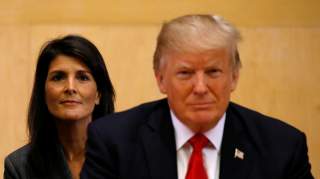Nikki Haley Is Just Another Victim of Trump Town
How will the former UN ambassador be remembered?
Nikki Haley, the former popular governor of South Carolina, always seemed like a strange fit for the Trump administration. She was by no means a card-carrying member of Donald Trump’s “America First” nationalism. In fact, her political philosophy was far more in tune with what the Republican Party was trying to be after Mitt Romney’s disappointing loss to Barack Obama: more open to moderation on immigration, more attractive to African American and Hispanic-American voters, less stiff and condescending on social and fiscal issues.
It came as a surprise that Trump nominated Haley to be his ambassador to the United Nations weeks after the 2016 election. For a man with paper-thin skin who never forgets a sleight and who is fixated on personal loyalty, Trump’s reaching out to Haley went against those very characteristics. After all, she was a loud, high-profile, and vociferous critic of Trump throughout the 2016 campaign, first endorsing Florida Sen. Marco Rubio and then switching her support to Texas Sen. Ted Cruz when Rubio was embarrassed in his home state. She was one of those Republicans making an issue of Trump’s tax returns. And when Haley delivered the GOP’s response to President Obama’s last State of the Union address in January 2016, she all but begged Americans to run away from Trump’s narrow-mindedness and demagoguery. “During anxious times, it can be tempting to follow the siren call of the angriest voices,” she said. “We must resist that temptation. No one who is willing to work hard, abide by our laws and love our traditions should ever feel unwelcome in this country.”
Haley entered the administration as a founding member, a professional who would leave the politics of the 2016 primary aside and work on behalf of the president’s agenda at the United Nations. She talked tough on her very first day, promising her colleagues in New York that she would be on constant watch for those countries that cooperated with the United States, those that gave the United States trouble, and those that actively worked to undermine it. While she described herself as honored and excited to be working in such an historic institution, she insisted in the same breath that the UN bureaucracy was in sore need of repair and accountability. At the end of her first year on the job, Haley held up a $285 million cut to the UN’s regular budget as a sign of things to come. “The inefficiency and overspending of the United Nations are well known,” she wrote in a statement announcing the new figures. “We will no longer let the generosity of the American people be taken advantage of or remain unchecked.”
Will Nikki Haley be remembered as a great U.S. ambassador? Almost certainly not. The position of America’s chief representative to the UN is often a thankless one; there is very little that can be done without the cooperation of the other members. Like all of her predecessors, Haley was constantly obstructed by Moscow and Beijing’s veto at the Security Council, a tool the Russians in particular have used to bottle up the process, block UN reports that paint them in a negative light, and water down resolutions that would turn out far weaker than Washington would like. Haley’s biggest accomplishment on the Security Council, attaining Russia and China’s consensus on a increasingly stringent sanctions resolutions against North Korea, are now being undercut by those very same countries—ship-to-ship transfers of illicit goods on the high seas by the Chinese and open ports courtesy of the Russians.
Haley’s decision to resign was just as sudden as Trump’s decision to hire her in the first place. The president will now be interviewing candidates over the weeks and months ahead. Nikki Haley, in the meantime, will be thinking about higher political ambitions after the Trump era sunsets.
Daniel R. DePetris is a fellow at Defense Priorities. He is also a contributor to multiple publications, including CNN, The Diplomat, The American Conservative, and many others.

